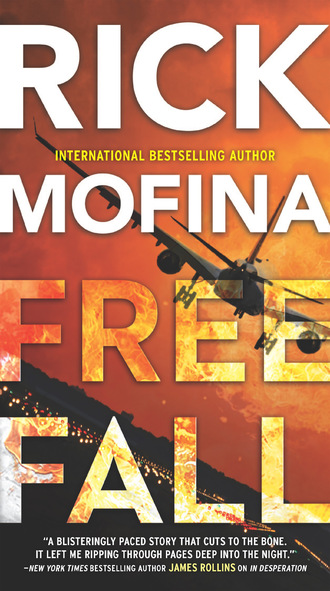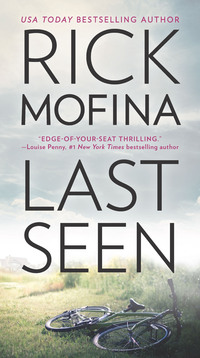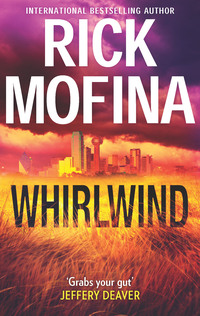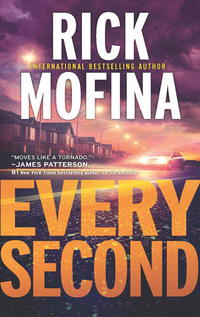
Полная версия
Free Fall
Hooper’s exceptional work led to a position as an NTSB regional investigator then, eventually, a job with Major Investigations Division at their headquarters in Washington. His insights impressed seasoned experts and he was not afraid to challenge supervisors. Hooper didn’t care because he adhered to the belief, as did all investigators, that safety was paramount; that with each tragedy, each incident, his job was to find information that would prevent other accidents and enhance the safety of air travel.
He was obsessed, almost pathologically so, with ensuring that nothing in an investigation was ruled out without being triple-checked and triple-checked again.
Today, he was anxious because this was his last time on a Go Team as a senior air safety investigator. After this investigation, he’d be promoted to investigator-in-charge, the IIC, and would lead his own team.
Hooper’s cab stopped at Departures and he headed for the American Airlines desk. The NTSB comms center had sent him an electronic ticket for the next flight to LaGuardia. Tapping his mobile boarding pass and showing his ID, Hooper made his way through security to the preboarding area of his gate, where he recognized members of the Go Team.
“Hey, Jake, you old tin-kicker.” Swanson, the expert on power plants, shook his hand.
They were joined by Willet from maintenance. From human performance, sitting off alone working on a laptop, was Irene Zimm. She was known as Good Night Irene, because if she found that a pilot had violated any aspect of safety procedures, it meant a world of pain.
The one man who didn’t greet Hooper was on the phone: Bill Cashill, a case-hardened veteran. He had no love for Hooper, who’d once corrected Cashill at an investigation, something Cashill had never forgotten and never forgiven. Cashill was set to retire after thirty years as a leading investigator on some of the board’s biggest crashes. He was the investigator-in-charge. He glanced at Hooper then resumed concentrating on his call before he finally stood and surveyed his team.
“What do you think about this EastCloud incident, Bill?” Willet asked.
“I think this is overkill, even with a partial team.”
“But it’s a new-generation aircraft,” Swanson said.
“I’m aware of that, but my gut’s telling me that this thing has all the indications of an overreaction by the crew to clear-air turbulence.”
“But the crew said—” Hooper started.
“I know what the crew said, Jacob.”
Hooper preferred to be called Jake, and Cashill knew it.
An uneasy moment passed before Irene Zimm broke it.
“Bill, would you come over for a second and look at this?”
Cashill went over to Zimm, who turned her computer so he could see the screen. They chatted quietly. A short time later, they boarded their jet for the one-hour flight to New York. As it leveled off, Hooper took stock, reflecting on Gwen. They’d been high school sweethearts and they had an anniversary coming up. He was going to surprise her with a pearl necklace and matching earrings.
The soft cry of a baby two rows ahead saddened him, not only because Hooper and Gwen would never have children, but because it pulled him back to the horrors of his job.
No matter how many investigations he’d done, it never got easier. He’d lost count of how many times he’d found charred remains, dead passengers holding each other at the moment of impact, victims entwined in metal debris, impaled in trees, buried in the ground.
He still had nightmares.
The baby in the seat ahead continued crying and pulled him back to last year, when a commuter jet had lost both engines on its approach to Memphis during a storm at night and plowed into a hillside. Forty-seven people had died. Walking alone in a wooded area among scattered pieces of twisted wreckage, Hooper had come upon a baby.
The only visible injury had been a tiny bloodied scrape on its head.
The child had been beautiful, a perfect angel, wearing pajamas with teddy bears and rabbits. Its eyes had been closed and it had appeared to be sleeping as a soft breeze lifted strands of its hair.
The baby had been dead.
Suddenly the wall Hooper had built to protect himself from the emotional toll of his work had crumbled and he’d been overcome. He’d dropped to his knees beside the baby and said a silent prayer, had removed his jacket and gently covered the child, then reached for his radio to call the medical examiner’s staff.
Now, as his plane jetted to New York, he looked at the sky, relieved this incident had had no fatalities.
Seven
Queens, New York
The next morning a vacuum cleaner hummed down the hall from a meeting room in LaGuardia’s central terminal.
Outside the room’s closed doors, Captain Raymond Matson waited alone to be interviewed by NTSB investigators. Nervous tension had dried his throat and he’d grown thirsty.
He hadn’t slept well.
He thought of his passengers and crew—they’d suffered fractures and concussions. Rosalita Ortiz, one of the flight attendants, had broken her back.
Matson clenched his eyes tight.
He’d already given a verbal report to an FAA inspector who’d met him and the first officer yesterday at the gate, and he’d provided a blood sample for analysis.
After several seconds, Matson opened his eyes. He resumed reviewing his notes when his phone vibrated with a text from his lawyer.
Papers are ready to sign whenever you can drop by. That’ll be it.
Matson stared at the message. With his signature, his sixteen-year marriage would be over. For a brief instant, he remembered a time when they’d been happy. He stared at a mural on the wall of Manhattan’s skyline and his wife’s accusations played through his thoughts:
You’re never home. You’ve become a ghost to us and I’m so tired of being a single parent to three children.
She’d already taken the kids and moved back to Portland. She’d let him take care of the house in Westfield; a for-sale sign was on the front lawn. She’d get 60 percent when it sold, according to the settlement. It was true. He’d missed birthdays, Little League games, recitals and graduations. He was married to his job and now it was hanging by a thread. The doors opened.
“Captain Matson, we’re ready to see you.”
A woman invited him inside to an empty chair at one end of a large boardroom table. The woman, dressed in a burgundy jacket, white top and matching pants, took her seat at the opposite end.
“Thank you for coming in so early this morning, Captain. I’m Irene Zimm with NTSB. I’ll be leading this session. To my right is Bill Cashill and Jake Hooper with the NTSB, then we have...”
She introduced the half dozen other officials who were seated at the table with notepads and pens poised. Small microphones rose from the table before each of them, as well as Matson himself. All eyes and a video camera were on him as Zimm proceeded.
“As we begin, you understand that this interview is being recorded, and anything you say will inform our investigation?”
“Yes, I understand.”
“And you understand the rules and policies of the board, your airline and union, about talking to the media or public?”
“Yes, I understand.”
“Very well, we’ll go over some preliminary matters. We have a summary of your verbal report. You’ve been in contact with Gus Vitalley from the pilots’ union, seated to your left.”
“Yes, we spoke yesterday.”
“And we have your blood sample.”
“Yes.”
Zimm tapped her pen on an open file folder she had before her and consulted a laptop next to it. “We’ll confirm your personal background with you. You’ve been with EastCloud for approximately thirteen years, and have been a captain for six of those years, correct?”
“That is correct.”
“You have over twelve thousand total flight hours, of which you were pilot-in-command for seven thousand flight hours.”
“Yes.”
“I see that you have no incidents and no failed check rides.”
“Correct.”
“As for the new Richlon-TitanRT-86, you have approximately eight hundred flight hours as the pilot-in-command.”
“Yes.”
“Prior to this trip, you and the first officer, Roger Anderson, had flown together twice before?”
“Yes. Chicago to San Diego and Phoenix to Atlanta, both in RTs.”
“Thank you. The aircraft has been taken out of service and moved to a maintenance hangar. The flight data recorder and the voice cockpit recorder have been removed and sent to our lab in Washington for analysis. We’ll also be examining air traffic control radar and weather. Now, leading up to the incident, you reported the trip as routine with no weather issues.”
“That’s correct.”
“Approximately twenty-five minutes into the flight, your course was one hundred fifteen degrees southeast, speed was four hundred ninety-one knots and your altitude was twenty-seven thousand feet, when you experienced a sudden, unintended series of roll oscillations, ninety degrees to the right then ninety degrees to the left, then a banked, unintended descent of seven thousand feet before you, Captain, regained control of the plane and alerted New York Center, then LaGuardia.”
“That’s correct.”
Zimm looked to the experts around the table as a cue to begin questioning Matson.
“The autopilot was engaged prior to the incident?” Bill Cashill asked.
“It was.”
“Did you at any time encounter turbulence?”
“No. And there was nothing of note on radar, and no reports of turbulence from earlier flights.”
“Clear-air turbulence doesn’t appear on radar, and the autopilot could make any needed adjustments for it,” Cashill said.
“I’m aware of the characteristics of clear-air turbulence. We didn’t encounter it.”
“Captain Matson,” Cashill said, “the Richlon-TitanRT-86 is a fly-by-wire model with an array of auto-detect safety systems to address any anomalies or problems that arise. The new design also has a provision that allows the pilot to disable those safety features so that in an emergency he or she can make control inputs that would not otherwise be permitted.”
“I am absolutely aware of the features of the RT-86.”
“Speaking strictly from a preliminary perspective, a strong theory would be that you encountered clear-air turbulence and did not feel the aircraft was responding to it, leading you to take the extreme step of disabling the safety features. In the process you overcontrolled the aircraft, causing the severe rolling, before you regained control.”
“I’m telling you there was no turbulence and I’m telling you that I did not disable the safety features. For a time the aircraft just went crazy and when I intervened, it refused to respond to our inputs. After we got tossed around, the plane inexplicably allowed me to take control again. This was a flight control computer malfunction, not pilot error.”
“No one said it was pilot error, Captain,” Cashill said.
“That’s what you’re implying, from a preliminary perspective.”
A few long, tense seconds passed before Jake Hooper spoke.
“Our analysis is not complete. We still need to download the data and conduct a full examination of the aircraft, along with other aspects.”
Another moment passed as Irene Zimm flipped through pages of a file folder then looked over her glasses at Matson.
“Captain, I’m looking at the results of your blood analysis.”
Matson met her gaze and braced himself.
“It shows traces of antidepressants.”
“Yes, I’m taking medication prescribed by my doctor.”
“Yes,” Zimm said. “I see that, and in keeping with airline policy you’ve reported the prescription and that it arises from therapy you’re undergoing as a result of divorce proceedings.”
Matson cleared his throat and swallowed hard at having his life exposed to the painful core.
“Yes,” he said.
“It’s my job to be familiar with the impact of substances,” Zimm said, “and I’m familiar with the adverse side effects of some antidepressants. Did your doctor tell you that the medication you’re taking can, and I’m not saying this happened in your case, but can, in some instances, cause you to become agitated, emotional, suffer insomnia and confusion?”
“Yes, she did. But she indicated—and it should be in the file—that in my case, the medicine and dosage put me at a very low risk of exposure to those adverse effects and she green-lighted me to fly.”
“Yes, I see that in your file.”
Zimm tapped her pen and went around the table for follow-up questions.
Half an hour later, Matson was free to leave.
Since he was pulled from EastCloud’s roster to fly for at least a week, he went to Manhattan and walked through Central Park until early afternoon. Amid the splendor of the trees, the ponds, the lawns and the gardens, he felt the walls of his world closing in on him.
He knew what was coming.
Matson went to Saddle River, ended his marriage and asked his divorce lawyer to recommend a criminal defense attorney.
Eight
Manhattan, New York
Kate woke up angry.
In the shower she scrubbed until her skin reddened, as if she could wash away yesterday’s indignation.
I can’t believe what Sloane and Reeka did. Are they setting me up to get rid of me?
Toweling off, she tried to calm down but it was futile.
Senior management knew about Reeka’s incompetence, her arrogance and her mean-spiritedness, but they were afraid to do anything about her because of her family connection to the board. And now here she was building her own fiefdom with minion jerks like Sloane.
Kate had had enough.
I could leave Newslead.
Sure, news jobs were scarce, but she had friends at Bloomberg and Reuters who could help her land something.
I could call them today.
Still, the thought of walking away from a news agency she revered, a job she loved, of leaving behind all that she’d strived for, everything she’d invested, not only saddened her—it sickened her.
I’m not going to give it all up because of Reeka. I bled to get here.
As she wiped the steam from the mirror Kate looked back on the tragedies and triumphs of her life. After her parents had died in a hotel fire when she was seven, she and her little sister, Vanessa, had lived with relatives for a while, and then in foster homes. One summer, they’d been on vacation in British Columbia with their foster parents, driving through the Canadian Rockies, when their car went off the road and crashed into a river. That moment still burned in Kate’s memory.
The car sinking...rolling...windows breaking...the icy water...grabbing Vanessa’s hand...pulling her free...to the surface...the frigid current numbing her...fingers loosening...Vanessa slipping away...disappearing...
Kate survived.
The bodies of her foster parents had washed up on the riverbank, but Vanessa’s body hadn’t been found. Searchers had reasoned that it had got wedged in the rocks downstream, but Kate had never given up believing that Vanessa had somehow gotten out of the river.
In the time following the tragedy, Kate had bounced through the foster system until she’d eventually run away, spending most of her teen years on the street or in youth homes, while keeping a journal and wondering about the little sister she’d lost. Kate had managed to get back into school, and eventually pursued her love of writing. She took any job she could get to put herself through community college where she’d studied journalism, then found work in newsrooms across the country.
In San Francisco, she’d become pregnant by a man who’d lied to her about being married. He’d offered to pay for an abortion before dumping her. That had been the end of that. Kate had kept her baby, a girl she’d named Grace. She’d moved to Ohio and worked at a newspaper in Canton for several good years before downsizing cost her that job. But she never gave up. She got a short-term reporting position in Dallas with Newslead and did outstanding work there, which impressed Chuck Laneer. He offered her a job as a national correspondent at Newslead’s world headquarters in Manhattan.
Kate knew how blessed she was to have the Newslead job, and to have her daughter and sister in her life.
We’ve all come a long way.
For some twenty years, Kate had never given up searching for Vanessa, even during her darkest moments. The day Vanessa was found after she’d been held captive, the day they were reunited, was a day that had changed them both forever.
Now it had been more than two years since her sister had been back in her life, living with her and Grace. Vanessa had proven to be unbreakable. Her therapy was helping her heal and she’d gotten her high school diploma. She was working as a waitress and taking business courses, determined to open her own restaurant one day.
The book that Kate and Vanessa had written together on their lost years had done well, providing Vanessa with some savings and Kate with a college fund for Grace.
We’re hanging in there.
Kate glanced at the time. She was running late.
Pulling on her robe, she went down the hall to Grace’s room, taking in the stuffed bears and bunnies, the posters of Harry Styles and Justin Bieber. The corkboard held Kate’s favorite item: a drawing of three stick people with enormous smiles entitled “Mommy, Aunt Vanessa and Me.” The newest was a picture of Grace in the planetarium at the Vanderbilt Museum. She’d written on the bottom: “I want to live on a star.” She’s growing up too fast, Kate thought, as she gazed upon her sleeping daughter. She bent over the bed, gently brushed Grace’s hair aside and kissed her cheek, causing her to stir.
“Time to get up and get ready for school, kid.”
Grace moaned and pulled the sheets over her head.
“You better get moving, kiddo, or you’re gonna be late. Okay?”
Kate patted her leg. Grace’s head nodded under the covers and Kate returned to her room to get dressed. But she paused. She needed to know how the competition had done on EastCloud Flight 4990. She checked the New York Times, the Wall Street Journal, the Post, the Daily News and the other wires.
I’ve been pushed off this story. Why do I care?
Because deep down it was her story.
She had an emotional connection to it. The image of Diane Wilson’s farewell video to her family burned in Kate’s mind as she tried to imagine the horror of what the people on that flight had faced. One moment you’re living your life. The next moment you’re falling from the sky, expecting to die.
What happened to that plane?
No one had broken any new angles on the story. She put her phone down, finished dressing and went to the kitchen where Vanessa was working on her laptop, concentrating behind her glasses, hair curtained to one side. For a moment Kate acknowledged some facts of her sister’s tragedy. She had not just been found, she’d been a prisoner before she was rescued, and the man who’d held her all those years had allowed her to read. In fact, he’d given her all kinds of books—novels, text books, encyclopedias and dictionaries. Books had become her lifeline. Her reading and comprehension skills were remarkable, the therapists had said. Despite her nightmare, her lost years and everything that she’d endured, Vanessa had emerged a poised, self-assured, beautiful young woman, Kate thought.
“You’re up early,” Kate said.
“Got a test coming. I need to study.”
“Commerce?”
“Economics. I made some raspberry tea.”
“Thanks. I could use it.”
“You got back later than we expected. How’d things go for you yesterday?”
“Awful. I’m thinking of leaving Newslead. The place is falling apart.”
Vanessa looked up from her work, pushed her hair back.
“But you love it there. You’re devoted to that place.”
Hands cupped around her mug, Kate shook her head, sipped some tea and told Vanessa about her ordeal. When Kate finished, Vanessa considered the matter then said, “You don’t want to quit over this.”
“Why not?”
“You’re bigger than that.”
“What do you mean?”
“Just let it go.”
“But what happened is wrong on so many levels, and I don’t see it getting better.”
“It all comes down to bumper sticker clichés, Kate. ‘What doesn’t kill us makes us stronger.’ Suck it up, step back and look at where we’ve been and where we are now. You’re tougher than Sloane and Reeka and you know it.”
Absorbing Vanessa’s suggestion, Kate caressed the guardian angel necklace she always wore as she looked to the wall, at the framed cover of the book they’d written together: Echo In My Heart: A Relentless Story of Love, Loss and Survival. For years, Vanessa had been locked up by a madman, and Kate had helped rescue her. Through it all, neither of them had quit and neither of them had given up hope. Vanessa was Kate’s inspiration.
“You make a good point,” Kate said.
“Think it over. I’ve got to get dressed.”
Vanessa smiled before she left. Alone in the kitchen, Kate couldn’t suppress her need to know more about EastCloud Flight 4990. She got on her phone and again researched the plane. Again, as far as she could tell, the Richlon-TitanRT-86 was a new model, without any known history of major problems. The crew said it was a malfunction, not turbulence. And in its statement, EastCloud had said the flight had “encountered a situation on its approach into New York.”
Kate was mulling over what she knew when her phone vibrated with a text from Tara Lawson, a reporter at Newslead.
OMG the rumors were true! Chuck Laneer is back!
What? This a joke, Tara?
I’m looking at him in his office now! Maybe he can save us all?
Kate’s spirits soared. Chuck was back. This changed everything.
“Mom? Did you hear me?”
Kate looked from her phone to Grace.
“Can I get new shoes, pink ones like Amber got?”
“No, sweetie. The shoes you have are still new. Maybe in the fall.”
“But Mom! Did you see Amber’s shoes? They’re so amazing!”
“Did you remember to clean the sink when you finished?”
“Yes.”
“What do you want for breakfast, something quick?”
“Toast with honey.”
“Okay, remember your chore today—you water the plants while I fix your toast. Want orange juice or milk?”
“Milk.”
“Milk what?”
“Milk, please and thank you.”
As Kate prepared her daughter’s breakfast, her phone vibrated with another text. This one was from Chuck Laneer, and in typical Chuck fashion, he got straight to the point.
Hey Kate. As you no doubt heard, I’m back. Want to meet with you ASAP to discuss the Flight 4990 story.
I’ll be there within an hour.
Sooner would be better.
Welcome back, Chuck.
Nine
Manhattan, New York
Kate waited alone in Newslead’s corner meeting room.
Looking out at the majestic view of Midtown’s skyscrapers, the Chrysler and Empire State buildings, she reflected.
It had been three years since she’d started working at headquarters for Chuck and she thought about everything that she’d reported on in that time: all the crime, disasters, tragedies, investigations. And with most stories, especially those where she’d dealt face-to-face with victims and their anguished families—I’m so sorry but would you have a picture of your son-daughter-wife-husband-brother-sister-loved-one you could share with us?—she’d given a piece of her soul.
In her heart, she was honored to be part of Newslead because of its history of excellence in journalism, and it troubled her that its integrity was being eroded. But Chuck’s return gave her hope and reason to reconsider leaving, because if anyone could restore morale and rebuild the newsroom it was Chuck Laneer.
A shadow fell across the room.
“Good morning, Kate.”
She felt as if the air had suddenly been poisoned. Sloane flashed his brilliant grin, set his notebook and coffee down then took a seat across the table from her.








